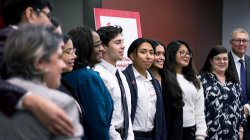Leading With Their Hearts
Montclair’s 2022 American Heart Association’s HSI Scholars honored with pinning ceremony
Posted in: Hispanic Initiatives, University

Six Montclair State University students participating in the American Heart Association’s Hispanic Serving Institutions Scholars Program recently were honored with a pinning ceremony at Susan A. Cole Hall.
“This is a symbolic ceremony to keep our scholars moving forward and to let them know that we are here for them,” said Mitzi Cardona, AHA’s portfolio advisor for Collegiate Diversity Partnerships – Hispanic-Serving Institutions. The Association sponsored the event, which also recognized the students’ mentors.
Katia Paz Goldfarb, associate provost for Hispanic Initiatives and International Programs, said Montclair provides “the optimal academic ecosystem for student success, especially for Hispanic students. They are the center, they are doing the work, and we are here to support them and provide opportunities for growth.”
“We’re here to celebrate you, you’re the stars,” Cardona told the students before the pinning ceremony.
Stacey Ingram, Network Initiatives Lead for Diagnostics®, pinned a heart-shaped pin on the students from Montclair and one from William Paterson University. “The pinning ceremony is symbolic to the welcoming of the new scholars and their commitment and dedication to personal, academic and professional achievement,” Ingram said before calling them up one by one.
In its first year of participating in the program, Montclair has the largest number of scholarship winners, six of 30 scholars selected nationally. They include: Jeffrey Yumbla, a sophomore Biochemistry major; Melissa Spigelman, a junior Molecular Biology major; Lizet Negrete, a senior Public Health major; Wendy E. Islas, a sophomore Molecular Biology major; Yaire Hernandez, a junior Public Health major; and Kenneth Mosquera-Reinoso, a senior Biochemistry major. All of the students must work on research projects supervised by mentors and are provided with academic and professional development and a scholarship to help them pursue their goals of working in health care. They will present the findings at a research symposium in the spring.
Funded by Quest Diagnostics, the American Heart Association created the scholars program with the goal of diversifying the health-care industry by partnering with Historically Black Colleges and Universities and Hispanic-Serving Institutions. “While 18 percent of the U.S. population is Hispanic or Latino, only 0.6 percent of U.S. medical doctors are Hispanic or Latino,” Cardona told those in attendance. “This disparity is consistent in research and the overall health-care professions.”
Yumbla knows this all too well. “I’ve already experienced health disparities firsthand, so it’s something I’m very passionate about,” he said.
In his five years of dealing with pancreatitis, including more than 20 trips to emergency rooms and surgery three years ago, Yumbla said he saw a few Latino nurses but never a doctor. “There’s a lack of physicians who look like me or who speak Spanish,” he said. “I know how to speak English but I think of other kids who were in the same ER as me or adult patients who may not know as much English. That’s not to discredit any physician or nurse but I didn’t feel represented.”
That lack of representation prompted him to study biology, and he plans to apply to medical school.
When Spigelman was in high school, her best friend was diagnosed with non-Hodgkin’s lymphoma and underwent radiation and chemotherapy. That prompted her to start doing research and contact Montclair Biology Professor Carlos Molina, who specializes in cancer and reproductive research. Molina now mentors Spigelman and Islas, overseeing their research on zebrafish.
Citing examples such as increased maternal mortality rates among Black women and a recent study showing that pulse oximeters inaccurately measured oxygen levels of people with darker skin, resulting in patients of color receiving less supplemental oxygen than white people during the COVID-19 pandemic, Spigelman said she was aware of disparities “but I didn’t realize how systemic the issues were. That really changed my outlook and that told me that I have to do something about this.”
“My plan is to get my PhD and continue doing research but working with the American Heart Association has really changed my plans,” she said. “I want to do research into health-care disparities but also use my voice to help educate the community about healthcare disparities.”
Negrete said she wants to specialize in epidemiology.
“There’s a lot of data still to be shown, especially for the governments, whether at the federal or local level, to address to underserved communities. Beyond showing the data, there has to be action behind that data,” she said, adding that her goal is “to serve the community.”
Students also received recognitions from Provost and Senior Vice President for Academic Affairs Junius Gonzales, Lois V. Greene, interim Chief Strategic Integration and Healthy Equity officer at University Hospital and a longtime volunteer with the American Heart Association, and Jalen Crespo, a 2021 AHA HSI program alumnus, who is currently studying for the MCAT.
Crespo, who graduated from City College of New York with a Bachelor of Science in Biology, encouraged students and said: “We can all improve our communities and ourselves. Shine that light.”
Story by Staff Writer Sylvia A. Martinez. Photo by Kino Vera.
You may also like: Diversifying Health Care
